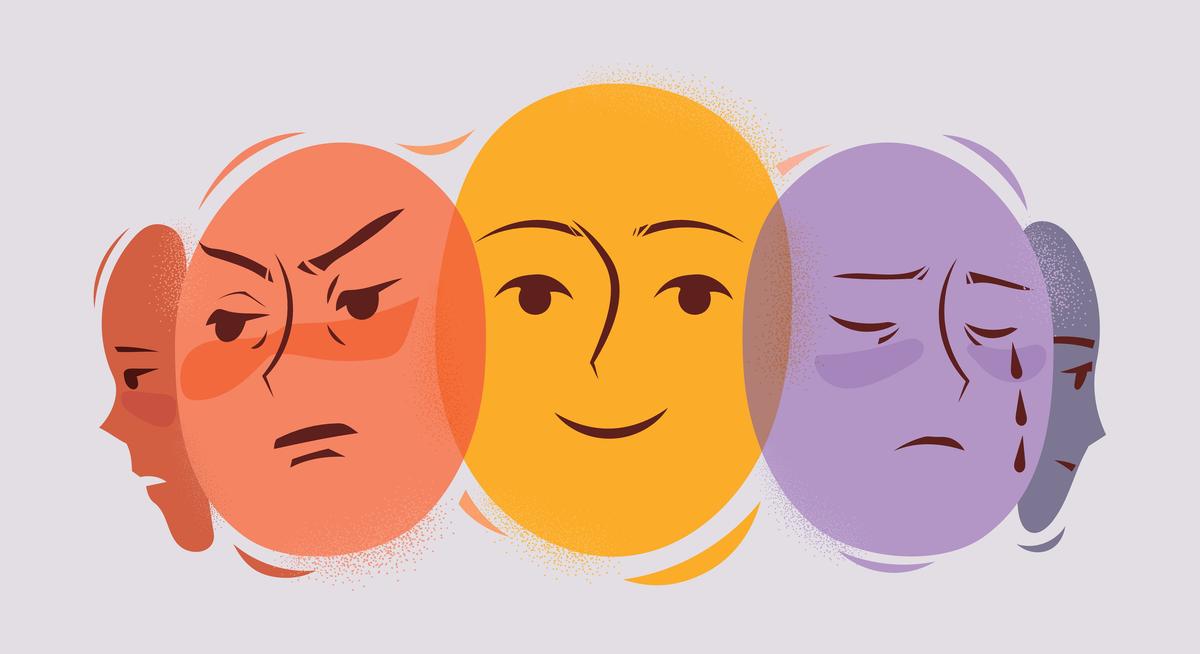Navigating Lifes Extremes with Bipolar Disorder
Bipolar disorder, formerly called manic depression, is a mental health condition that causes extreme mood swings such as emotional highs (mania or hypomania) and lows (depression) for some time. When an individual becomes depressed, they may feel sad or hopeless and lose interest or pleasure in most activities (1).
It is a complex mental health condition that affects millions of individuals worldwide. Its distinctive highs and lows can disrupt daily life and relationships.
Symptoms
Bipolar disorder symptoms can make it daunting to deal with day-to-day life. It can hurt relationships and work. Here are the types of symptoms described below.
Mania
- Feeling happy or excited, even if things aren’t going well
- Being full of new and exciting ideas
- Moving quickly from one idea to another
- Racing thoughts
- Talking very quickly
- Hearing voices that other people can’t hear
- More irritable than normal
- Feeling much better about oneself than usual
- Easily distracted and struggle to focus on one topic
- Not being able to sleep or feeling that one doesn’t want to sleep
- Having an inflated sense of self-esteem
- Make unusual or big decisions without thinking them through
- Doing things, one usually wouldn’t do; which can cause problems. Examples are: using drugs or making unwise decisions (2).
Hypomania
Hypomania is like mania but affected individuals will have milder symptoms.
- Increased energy and productivity
- Elevated mood or irritability
- Increased self-confidence or grandiosity
- Decreased need for sleep
- Racing thoughts or difficulty concentrating
- Engaging in pleasurable activities with a high risk of negative consequences
Depression
- Low mood
- Less energy and feeling tired
- Feeling hopeless or negative
- Feeling guilty, worthless, or helpless
- Less interested in things one normally like doing
- Difficulty concentrating, remembering, or making decisions
- Restless or irritable
- Sleeping too much or not being able to sleep
- Eating less or overeating
- Losing or gaining weight when one doesn’t mean to
- Thoughts of death or suicide, or suicide attempts.
Psychosis
Sometimes an individual can have psychotic symptoms during a severe episode of mania or depression. For example, if you have a manic episode, you may believe that you have special powers or are monitored by the government. If someone has a depressive episode, they may feel guilty about something they think they have done. They may feel that they are worse than anybody else or feel like they don’t exist.
Prevalence
Bipolar disorder often occurs in families: 80 to 90 percent of individuals with bipolar disorder have a relative with bipolar disorder or depression (3). Environmental factors such as stress, sleep disruption, and drugs and alcohol may trigger mood episodes in vulnerable people. While
the specific causes of bipolar disorder within the brain are unclear. However, an imbalance of brain chemicals is believed to cause dysregulated brain activity. The average age of onset of this condition is 25 years old.
Types of Bipolar Disorder
There are two common types of bipolar disorder which are; bipolar I disorder and bipolar II disorder. Some individuals living with this condition experience several symptoms that may be different from those specifically associated with bipolar I or II.
Bipolar I Disorder
This is the more severe form of bipolar. It involves at least one period of mania in one’s lifetime. That episode may be extreme and dangerous. They may also experience depression, but they don’t have to have a major depressive episode to be diagnosed with this type.
People with bipolar I disorder frequently have other mental disorders such as anxiety disorders, substance use disorders, and, or attention-deficit/hyperactivity disorder (ADHD). The risk of suicide is significantly higher among people with bipolar I disorder than among the general population (4).
Bipolar II Disorder
This can look similar to bipolar I, but this type always has depressive episodes with occasional hypomania. Bipolar II isn’t a milder form of bipolar- it’s a separate diagnosis. But some people with bipolar II go on to develop bipolar I (5).
Causes and Risk Factors
The exact causes of bipolar disorder are unclear. But research suggests that a combination of factors could increase the chance of developing it. Still, the following could be reasons to trigger bipolar symptoms:
- Childhood trauma
- Stressful life events
- Brain chemistry
- Family links
- Medication, drugs, and alcohol (6).
Also, defects in mitochondrial DNA sequences may contribute to a predisposition to such complex diseases as diabetes and bipolar disorder. Therefore, if all bipolar disorder patients have mitochondrial predisposition genes, the transition of bipolar disorder from the mother’s side would be higher (7).
Bipolar Disorder Treatment
Bipolar disorder is a lifelong condition. Treatment is directed at managing symptoms. Depending on individual needs, treatment may include:
- Medications: Individuals living with bipolar may need to start taking medications to balance their moods.
- Continued treatment: bipolar disorder requires lifelong treatment with medications, even during periods when you feel better. People who skip maintenance treatment are at high risk of a relapse of symptoms or having minor mood changes turn into full-blown mania or depression.
- Day treatment programs: affected individual’s doctor may recommend a day treatment program. These programs provide the support and counseling they need while managing their symptoms.
- Substance abuse treatment: if individuals have problems with alcohol or drugs, they also need substance abuse treatment. Otherwise, it can be difficult to manage bipolar disorder.
- Hospitalization: the doctor may recommend hospitalization if the person behaves dangerously, feels suicidal, or becomes detached from reality (psychotic). Getting psychiatric treatment at a hospital can help keep them calm and safe and stabilize their mood, whether they are having a manic or major depressive episode (8).
Also Read;
- 5 Unexpected Signs of Depression
- How to Cope with Depression
- Effective Ways to Deal With Anxiety
- The Importance of Mental Health in the Workplace
- A Journey Through Postpartum Psychosis









Comments (0)